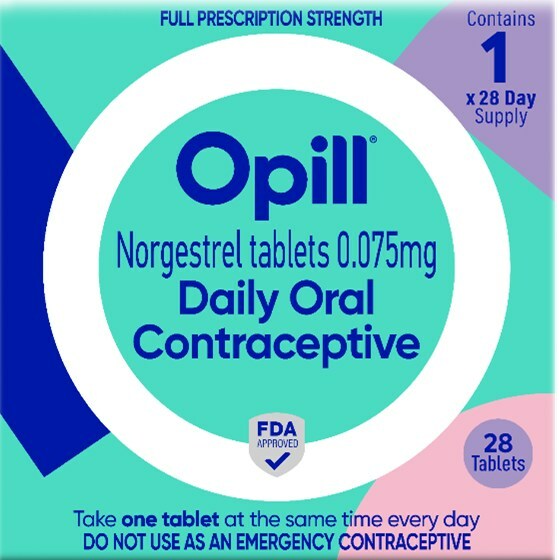FDA OKs first over-the-counter oral birth control tablet


A free daily email with the biggest news stories of the day – and the best features from TheWeek.com
You are now subscribed
Your newsletter sign-up was successful
The U.S. Food and Drug Administration on Thursday announced it had approved norgestrel tablets for over-the-counter sales, making the medication the first instance of a non-prescription oral birth control pill to be okayed by the government in the nation's history. "Approval of this progestin-only oral contraceptive pill provides an option for consumers to purchase oral contraceptive medicine without a prescription at drug stores, convenience stores and grocery stores, as well as online," the FDA said in a press release.
The medicine, known as "Opill," is expected to be available in early 2024, its Dublin-based manufacturer, Perrigo Company, told the New York Times. While no price for the medication has been announced, Frederique Welgryn, the company's Global Vice President for Women's Health, said in a statement accompanying the FDA's announcement that Perrigo is committed to making Opill "accessible and affordable to women and people of all ages."
Norgestrel was initially approved for prescription use by the FDA 50 years ago, with Perrigo Company launching its push to make the medication available without a prescription in 2015, according to an administration memo authored by Dr. Karen Murry, Deputy Director of the FDA's Office of Nonprescription Drugs.
The Week
Escape your echo chamber. Get the facts behind the news, plus analysis from multiple perspectives.

Sign up for The Week's Free Newsletters
From our morning news briefing to a weekly Good News Newsletter, get the best of The Week delivered directly to your inbox.
From our morning news briefing to a weekly Good News Newsletter, get the best of The Week delivered directly to your inbox.
"Increasingly, women in some parts of the U.S. have few options once an unintended pregnancy occurs," Murry noted, in direct reference to the ongoing push by conservative legislators and activists to limit reproductive health options for women seeking to end their pregnancies. "Thus, giving women greater ability to prevent a pregnancy, rather than to face wrenching personal choices after an unintended pregnancy occurs, has the potential for individual and societal benefit."
Opill's approval comes just months after an independent panel of 17 agency advisors voted unanimously that the medication's over-the-counter benefits outweighed any potential risks, including to those users who have had breast cancer, or are on other hormone-based contraceptives at the time.
According to the FDA, "almost half of the 6.1 million pregnancies in the U.S. each year are unintended," which has been linked to "negative maternal and perinatal outcomes." A 2016 study published in the Journal of Women's Health found that nearly one-third of all women who have tried to get a prescription or refill of their hormonal contraceptives had encountered difficulties doing so.
Use of Opill according to its directions is not only safe, explained Dr. Patrizia Cavazzoni, director of the FDA's Center for Drug Evaluation and Research, but it is also "expected to be more effective than currently available nonprescription contraceptive methods in preventing unintended pregnancy."
A free daily email with the biggest news stories of the day – and the best features from TheWeek.com
Rafi Schwartz has worked as a politics writer at The Week since 2022, where he covers elections, Congress and the White House. He was previously a contributing writer with Mic focusing largely on politics, a senior writer with Splinter News, a staff writer for Fusion's news lab, and the managing editor of Heeb Magazine, a Jewish life and culture publication. Rafi's work has appeared in Rolling Stone, GOOD and The Forward, among others.
-
 Touring the vineyards of southern Bolivia
Touring the vineyards of southern BoliviaThe Week Recommends Strongly reminiscent of Andalusia, these vineyards cut deep into the country’s southwest
-
 American empire: a history of US imperial expansion
American empire: a history of US imperial expansionDonald Trump’s 21st century take on the Monroe Doctrine harks back to an earlier era of US interference in Latin America
-
 Elon Musk’s starry mega-merger
Elon Musk’s starry mega-mergerTalking Point SpaceX founder is promising investors a rocket trip to the future – and a sprawling conglomerate to boot
-
 Trump HHS slashes advised child vaccinations
Trump HHS slashes advised child vaccinationsSpeed Read In a widely condemned move, the CDC will now recommend that children get vaccinated against 11 communicable diseases, not 17
-
 FDA OKs generic abortion pill, riling the right
FDA OKs generic abortion pill, riling the rightSpeed Read The drug in question is a generic version of mifepristone, used to carry out two-thirds of US abortions
-
 RFK Jr. vaccine panel advises restricting MMRV shot
RFK Jr. vaccine panel advises restricting MMRV shotSpeed Read The committee voted to restrict access to a childhood vaccine against chickenpox
-
 Texas declares end to measles outbreak
Texas declares end to measles outbreakSpeed Read The vaccine-preventable disease is still spreading in neighboring states, Mexico and Canada
-
 RFK Jr. shuts down mRNA vaccine funding at agency
RFK Jr. shuts down mRNA vaccine funding at agencySpeed Read The decision canceled or modified 22 projects, primarily for work on vaccines and therapeutics for respiratory viruses
-
 Measles cases surge to 33-year high
Measles cases surge to 33-year highSpeed Read The infection was declared eliminated from the US in 2000 but has seen a resurgence amid vaccine hesitancy
-
 Kennedy's vaccine panel signals skepticism, change
Kennedy's vaccine panel signals skepticism, changeSpeed Read RFK Jr.'s new vaccine advisory board intends to make changes to the decades-old US immunization system
-
 Kennedy ousts entire CDC vaccine advisory panel
Kennedy ousts entire CDC vaccine advisory panelspeed read Health Secretary RFK Jr. is a longtime anti-vaccine activist who has criticized the panel of experts
